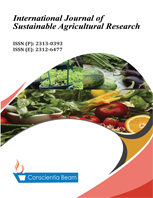Changes in Certain Agronomic Characteristics of Table Grape Cultivar Alphonse Lavallee’ in Response to Water Deficit under the Different Rootstock Effect
DOI:
https://doi.org/10.18488/journal.70.2019.62.110.116Abstract
The use of proper rootstocks for precision viticulture under increasing drought condition has a vital role, as the rootstocks vary in genetic response to various environmental stress factors. The present study was performed to investigate agronomic and growth responses of soilless grown four years old ‘Alphonse Lavallée’ vines to contrasting irrigation regime under the effect of different rootstocks. The study, conducted in glasshouse, was consisted of two irrigation levels [full irrigation (FI) and deficit irrigation (DI)] and two grafting combinations of the scion cultivar ‘Alphonse Lavallée’ with 41 B (Vinifera x Berlandieri) and 44-53 M (Riparia x Rupestris). The water holding capacity of soilless culture medium was used for to start FI, while fifty percent of FI was considered as DI. DI resulted in significant reductions in diameter and weight of the clusters of the scion grafted on both rootstocks with higher impact revealed in 41 B grafts. Generally, DI did not markedly impair the biochemical features of the must, except for the vines grafted on 41 B. Limitations in the leaf growth in response to DI were quite similar between the rootstocks. Pruning residue and vine yield reductions under DI were quite higher in vines grafted on 41 B than those of 44-53 M. In conclusion, 44-53 M seems more suitable for a water limited ecosystems on the condition that the lime stress is not a problem. Overall results revealed the differential response of the vines when grafted on different rootstocks.

